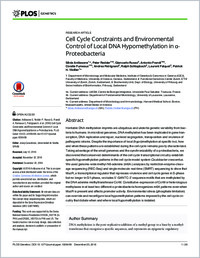Cell cycle constraints and environmental control of local DNA hypomethylation in α-proteobacteria
- Ardissone, Silvia Department of Microbiology and Molecular Medicine, Institute of Genetics & Genomics in Geneva (iGE3), Faculty of Medicine, University of Geneva, Geneva, Switzerland
- Redder, Peter Department of Microbiology and Molecular Medicine, Institute of Genetics & Genomics in Geneva (iGE3), Faculty of Medicine, University of Geneva, Geneva, Switzerland
- Russo, Giancarlo Functional Genomics Center Zurich, ETH/University of Zürich, Zürich, Switzerland
- Frandi, Antonio Department of Microbiology and Molecular Medicine, Institute of Genetics & Genomics in Geneva (iGE3), Faculty of Medicine, University of Geneva, Geneva, Switzerland
- Fumeaux, Coralie Department of Microbiology and Molecular Medicine, Institute of Genetics & Genomics in Geneva (iGE3), Faculty of Medicine, University of Geneva, Geneva, Switzerland
- Patrignani, Andrea Functional Genomics Center Zurich, ETH/University of Zürich, Zürich, Switzerland
- Schlapbach, Ralph Functional Genomics Center Zurich, ETH/University of Zürich, Zürich, Switzerland
- Falquet, Laurent Biochemistry Unit, Dept. of Biology, University of Fribourg and Swiss Institute of Bioinformatics, Fribourg, Switzerland
- Viollier, Patrick H. Department of Microbiology and Molecular Medicine, Institute of Genetics & Genomics in Geneva (iGE3), Faculty of Medicine, University of Geneva, Geneva, Switzerland
-
20.12.2016
Published in:
- PLOS Genetics. - 2016, vol. 12, no. 12, p. e1006499
English
Heritable DNA methylation imprints are ubiquitous and underlie genetic variability from bacteria to humans. In microbial genomes, DNA methylation has been implicated in gene transcription, DNA replication and repair, nucleoid segregation, transposition and virulence of pathogenic strains. Despite the importance of local (hypo)methylation at specific loci, how and when these patterns are established during the cell cycle remains poorly characterized. Taking advantage of the small genomes and the synchronizability of α-proteobacteria, we discovered that conserved determinants of the cell cycle transcriptional circuitry establish specific hypomethylation patterns in the cell cycle model system Caulobacter crescentus. We used genome-wide methyl-N6- adenine (m6A-) analyses by restriction-enzyme-cleavage sequencing (REC-Seq) and single-molecule real-time (SMRT) sequencing to show that MucR, a transcriptional regulator that represses virulence and cell cycle genes in S-phase but no longer in G1-phase, occludes 5'-GANTC-3' sequence motifs that are methylated by the DNA adenine methyltransferase CcrM. Constitutive expression of CcrM or heterologous methylases in at least two different α-proteobacteria homogenizes m6A patterns even when MucR is present and affects promoter activity. Environmental stress (phosphate limitation) can override and reconfigure local hypomethylation patterns imposed by the cell cycle circuitry that dictate when and where local hypomethylation is instated.
- Faculty
- Faculté des sciences et de médecine
- Department
- Département de Biologie
- Language
-
- English
- Classification
- Biological sciences
- License
- License undefined
- Identifiers
-
- RERO DOC 329819
- DOI 10.1371/journal.pgen.1006499
- Persistent URL
- https://folia.unifr.ch/unifr/documents/309101
Statistics
Document views: 81
File downloads:
- fal_plog_16.pdf: 100
